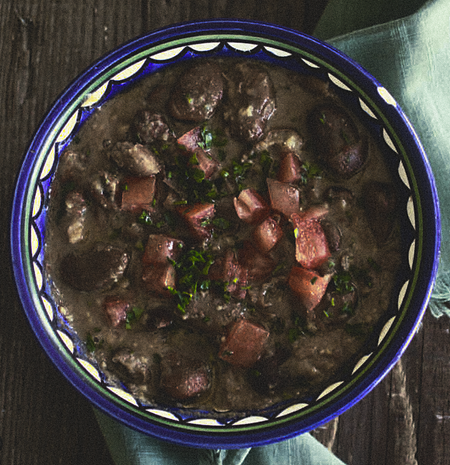FUUL
- 50ml neutral vegetable oil
- medium red or yellow onion, finely chopped
- large tomato, chopped
- two 300g tins fava beans, drained and rinsed (drained weight 550g)
- 150ml water
- 1 tbsp ground cumin, plus more for serving
- 1 tbsp table salt
- ½ tsp ground black pepper
- 1 lime, halved
- 100g feta cheese, as garnish
- 50ml virgin sesame oil, as garnish
- bread, for serving

Fuul is a staple dish enjoyed across Sudan, celebrated for its earthy flavors and nourishing qualities. Made from slowly simmered fava beans, this dish is typically seasoned with a mixture of peanut oil, garlic, and a variety of spices such as cumin and chili powder, giving it a rich and distinct taste. The beans are mashed to a hearty, thick consistency and often served with fresh vegetables like tomatoes and onions, along with a drizzle of lemon juice for added brightness.
In Sudan, fuul is more than just food; it’s a daily ritual and a cornerstone of social gatherings. Often served during breakfast or lunch, it’s accompanied by freshly baked bread, and people gather around to share this simple yet fulfilling meal. The communal nature of Sudanese fuul reflects the warmth and hospitality embedded in the culture, making it a dish that brings people together across all walks of life.
Sudanese fuul also shares roots with other variations of fuul across the Middle East and North Africa, with each region adding its unique twist to the dish. The practice of cooking fava beans dates back thousands of years, with evidence suggesting they were a staple food in ancient Egypt and other early civilizations. In Sudan, the preparation of fuul evolved into its own distinct tradition, incorporating local ingredients like peanut oil, chili, and fresh vegetables, setting it apart from other regional versions.
The cultural significance of Sudanese fuul extends beyond its role as a meal. It symbolizes sustenance, community, and tradition in a way that has endured for generations. Whether served at bustling market stalls or prepared at home for family gatherings, Sudanese fuul remains a cherished dish that speaks to the resilience and warmth of the culture. Its humble ingredients and nourishing qualities continue to make it a central part of everyday life in Sudan, reflecting a culinary legacy that has stood the test of time.
you will not find us on social media
